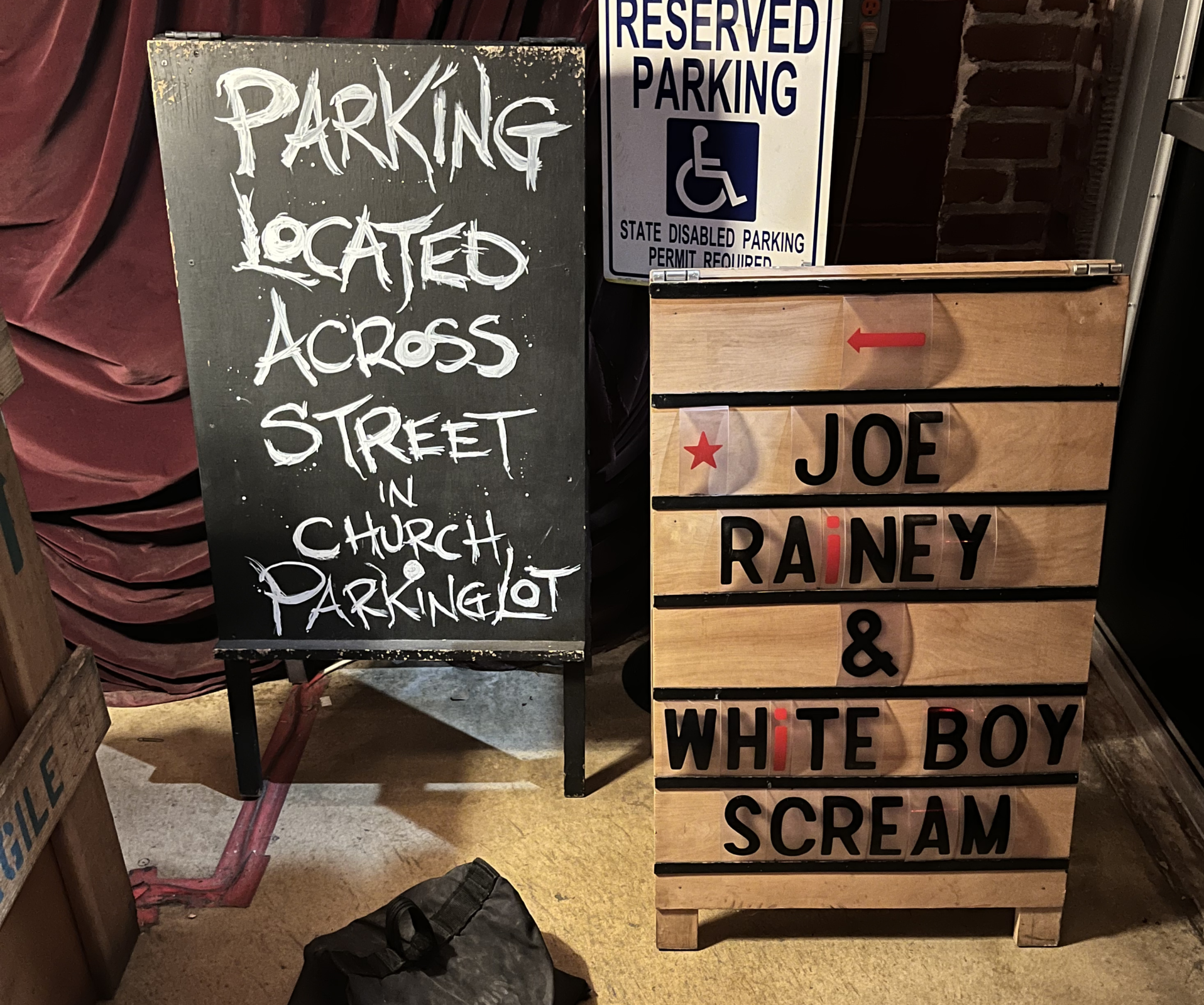Joe Rainey, White Boy Scream @ 2220 Arts + Archives 9/17/23
A 20-minute walk from my home for a wonderful, seated evening of music.
The last time I came to 2220 Arts + Archives, it was called the Bootleg Theater. The Bootleg booked acts like Quadron and Tkay Maidza, smaller, intimate shows with some of my favorite performers at the time. On the right night, you’re meeting Tkay in person and seeing just how tiny she is. At the wrong show, and up till September 17th, 2023, my last one here, it’s 2016 and election night and the 10pm concert started too late to make a difference: you’re already too drunk to enjoy or remember much of Swet Shop Boys. A tragedy considering my friend managed to meet both Heems and Riz. So you stumble home, losing a denim shirt along the way, arrive late and despondent to your Starbucks shift the next morning, and proceed to black out whatever else you haven’t already forgotten from your night at the Bootleg.
When initially researching this show, I noted its location on Beverly due to its close proximity to my own place. Only when I walked out on to Beverly, back into the routes I used to take, did the realization of where I was going dawn on me. I already had high hopes for the evening, and learning that a venue had survived the last seven years raised spirits high.
The theater space at 2220 had seating, a blessing at the end of a long weekend if there ever was one. Sinking into my chair, I steadied myself for the opener, Micaela Tobin, aka White Boy Scream. Accompanied by M.A. Harms on percussion and Stephen McNeely on strings, Tobin told the diaspora of Apolaki, the Filipino god of sun and war, and their displacement from their homeland to the shores of California.
Tobin’s formidable soprano established Apolaki’s godliness at the onset, a peaceful, harmonious setting crafted by her soft tones and ambient accompaniment. That tranquility shattered when Harms’s percussion grew louder and clangorous, symbolic of the colonization that would change fundamentally alter Apolaki. As the shift occurred, Tobin’s voice, already impressive in its clear soprano, showed us what it could really do, what stories it could really tell.
And so, her voice broke down, developing rasps at its edges and sinking into more nasally “human” timbres. Though she tried, reaching towards those deity notes in her upper register always resulted in her crashing back to earth in wails and wizened exhales. “I am looking for what was stolen from us” would wilt across its delivery from song to hiss, a sweeping, slow-burning progression of remarkable vocal control. She sounded unable to prevent Apolaki’s own power from seeping out from the back of their throat, toeing the line between sacred and soiled. It reminded me of Diamanda Galás, except instead of piano, Tobin used a set of pedals to loop these vocal feats.
As if her vocals hadn’t already hypnotized us, their layering ensnared us further. It pulled us into the transformation of Apolaki from idol to idea as his power slowly sapped from him. It enraptured the audience, each of us transfixed by looping combinations of song and scream. It enraptured the audience, each of us transfixed by overlapping combinations of song and scream. We, too, became passengers on his journey from the Philippines to Los Angeles, swept up in the maelstrom of Tobin’s vocal weaving.
A transfixing performance, White Boy Scream ended with a standing ovation, a well-deserved round of applause.
Humbly, Joe Rainey took the stage with little fanfare, joined by collaborator Andrew Broder on the synths and percussion.
Rainey appeared more than comfortable tackling touchy subjects with frank candor. He lifted direct soundbites from unlikely places like Squanto: A Warrior’s Tale: “Your tribe will die with no women.” Though the film reads as inaccurate and ethically unsavory, Rainey excavated positive parts to make a point. Not that we should look to Hollywood for lessons on Native American history, but that art itself allows for a multitude of interpretations and understanding. Take for example, a Red Lake Nation singer who performs over contemporary electronic music and brings said music to audiences across the United States, the institution responsible for so much of his people’s strife. There’s much to unpack, and Rainey encouraged the audience to do so, as songs like “easy on the cide” sliced through the air with their synthesizers. Not with anger, not with shame, but with gusto, enjoining folks to confront these complicated situations using complicated thoughts.
He never pretended to know the answers, but he knew how to reach them: action. “Step up, LA,” he repeated throughout a forceful speech before the finale. In a way, Rainey’s speech resonated with me much more strongly than his performance. That’s not to say it’s a bad thing (for one thing, it has motivated me to write this and a few other blog posts before the year comes to a close), though I wish I could say his performance left me as awestruck as Tobin’s. Their performing styles stood distinctly apart from one another, Tobin’s more dramatic and poised as opposed to Rainey’s simple, unassuming delivery, yet when shown in tandem, it was Tobin’s that resonated with me afterward. But again, if it weren’t for Rainey’s incendiary speech, this whole post might’ve never gotten published.
